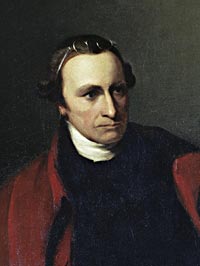Page content
Patrick Henry

(Born 1736, died 1799)
BIRTH DATE: May 29, 1736
BIRTHPLACE: Hanover County, Virginia
DEATH DATE: June 6, 1799
PLACE OF DEATH: Red Hill Plantation, Virginia
PARENTS: John and Sarah Winston Henry
EDUCATION: Educated by his father (including reading Latin). Studied law on his own
OCCUPATION: Lawyer. Set up private practice in Hanover Courthouse, Virginia, in 1760
OFFICES HELD: Delegate, Virginia House of Burgesses, 1765-1775; Member, Virginia Committee of Correspondence, 1773; Delegate, Continental Congress, 1774-1775; Delegate, Virginia Convention, 1776; Governor of Virginia, 1776-1779, 1784-1786; Delegate, Virginia Constitution Ratification Convention, 1788
MILITARY SERVICE: Commissioned as Colonel of the First Virginia regiment on Saturday, August 26, 1775, by the third Virginia Convention
PLACE OF RESIDENCE: Red Hill Plantation
SPOUSE: First wife — Sarah Shelton (ca. 1736-1775), married 1754; second wife — Dorothea Dandridge (1757-1831), married 1777
CHILDREN: Six from first marriage, eleven from second marriage
MISCELLANEOUS: Patrick Henry was one of the most outspoken opponents of the Stamp Act. On May 29, 1765, he introduced seven radical resolutions in the Virginia House of Burgesses. Five of the seven resolutions were adopted on May 30, though one was reconsidered the next day (after Henry's departure) and removed.
In May 1774, a message from the Massachusetts Committee of Correspondence informed Virginians of the closing of the port of Boston. The Virginia House of Burgesses set aside June 1, 1774, as a day of "Fasting, Humiliation, and Prayer" in support of the citizens of Boston. Governor Dunmore dissolved the assembly, but 89 of the Burgesses gathered at the Raleigh Tavern and, under Henry's leadership, proposed that all the colonies meet in a Continental congress.
In 1775, Henry learned that Governor Dunmore had seized gunpowder from the Magazine in Williamsburg on April 20. Within ten days, Virginians had heard about the battles at Lexington and Concord on April 19, increasing unrest. On May 2, Henry collected the militia of Hanover County and marched toward Williamsburg. He sent a message to the governor demanding that the gunpowder be returned to representatives of the colony. Governor Dunmore wrote the Virginians a bill of exchange for value of the powder, then issued a proclamation outlawing "a certain Patrick Henry" for disturbing the peace of the colony.